- Home
- Anthony Doerr
The Best American Short Stories 2019 Page 13
The Best American Short Stories 2019 Read online
Page 13
“Easy there, Dragon,” I cooed, fetching his dinner. I swung the bucket over his head to let him catch the scent of meat. “Hungry, buddy?”
The reptile snapped at the wire, his tub spattered with liquid shit. I prayed those Atomic Fireballs hadn’t torn him up too bad.
“Damn fools,” I hissed.
“Who?” asked Alex.
“Nothing.”
I unclamped the chicken wire.
“He won’t bite you or try to run?” Alex backed away from the cage.
“Got him trained,” I said, relieved to see Dragon creep halfway out the water onto his rock. He used to perch like an anole there, little and jaunty. Now, hemmed in by tub walls, he slithered, covering the mass of the rock with his body, tail whisking the tainted water. He stared up at me, gold-eyed, jaws cracked, waiting for the first giblet to dangle in his range.
Alex squawked when the gator jumped to snap the meat from its loose-tied noose. But by the third chicken gizzard, the fear had left him. When I lowered the baby bluegill, Alex inched up behind me, crouched hands-on-knees to peer. I could feel his body heat. Maybe that’s what flustered me. Maybe that’s what caused me to lean in too close and get snagged by a tooth—a jagged red rip right through the meat of my lower thumb. I didn’t scream, but Alex did. I had to shush him, tiptoe to secure the chicken wire while Dragon chewed in a trance, savoring the taste of fish splashed with his adoptive mother’s blood. Hot tears burned my eyes, but I didn’t let them spill. I grabbed my first-aid box from the cart and doused the wound with peroxide. Watched pink froth sizzle in the cut. Wiped it clean with fresh gauze and covered the ugliness with a Revco jumbo strip.
“Sure you don’t need stitches?” Alex asked that evening, after I’d whisked him off for fresh adventures.
“Just a scratch. Cleaned it again at home and put some antibiotic ointment on it. My mama works at the hospital, so we got medicine galore.”
We lazed in a cypress grove at the edge of the swamp, right where the woods got eerie. Frogs bellowed from the deep of it, down in the dark wet where the Swamp Ape lurked and pitcher plants opened their blooms to tempt insects into their acid bellies. When darkness came on, along with the glitter of bugs and stars, I taught Alex frog language: the twitter of wood frogs, the bark of tree frogs, the donk-donk of green frogs. Frogs bleated like sheep and rattled like woodpeckers, droned like power saws and bellowed like bulls. Peeper season was over, but I tried to imitate their high warble, like something from beyond the moon.
We stared up at the sky, didn’t look at each other, and shared secrets about our lives. I told Alex my mama was a vampire, according to my daddy. A pale woman who drew blood on the hospital night shift, she slept through most of the day. I told him about my father’s slipped disc, his failed soybeans and blighted corn, how he’d tried to stay busy after both cash crops failed. But his back was busted, and summer had broken him, driving him to drink when dusk came on. He tended to sit alone in our empty house.
“My parents’ clocks are out of sync,” I said. “And their moods never mesh. My mama sleeps in a mask in a darkened room, sun flicking around the edges of blackout blinds, while my daddy lurks through the house like a man held captive by silence.”
Alex spoke of his own dad, an engineer who worked the nuke plant, a giant fortress gated off from the world. Alex imagined it glowing on a hill, surrounded by forest, contaminated animals creeping radiant in the night. He feared his father brought radiation home in his clothes, that it mixed in the washing machine and poisoned them all. Maybe that was why his mom had birthed a preemie, a three-pound frog-eyed baby that struggled to breathe in his incubator.
“His eyes are dark silver like a shark’s,” said Alex, “and you can almost see right through his skin. If they keep him in oxygen too long, he’ll get brain damage. But if they stop the flow, he might die of asphyxiation.”
“Terrible,” I said.
But there were other babies even smaller than Matthew. One of them, a girl called Amy, just disappeared one day. Alex saw a grease spot on her sheet. And then the nurse pulled the sheet off the mini-mattress and gave him a weird look, wadded it up and threw it into a big rolling hamper. Made him wonder how many hospital sheets had been leaked on by the dead. Made him think about all the death mixed up in the washing machines and streaming from the HVAC vents.
We fell silent and listened to the frogs, with cricket-chirr shimmering over the lower calls. An owl hooted. A chuck-will’s-widow cawed its own name. And through this delicate symphony came the bellow of the Swamp Ape, mournful and longing, as though epochs of human misery had been mixed together into this one voice, ringing out from the deepest dark. I knew where the creature’s hovel was, a shack so mossy it looked like a bear’s den, part and parcel of the wood. I’d seen pieces of the creature in the circle of my flashlight: a crazed red eye, a roaring maw, a hairy arm reaching out to snatch the Slim Jims I fed him from time to time.
“What the hell is that?” asked Alex.
“It’s the Swamp Ape,” I said. “Monster of the forest who only comes out at night. Some people say he’s a throwback to ape times, a variety of Bigfoot that’s half-aquatic. Others think he escaped from Clemson University, a lab-made creature half-human, half-ape. Another faction believes he’s a regular man, gone feral from drink and craziness, second cousin and once-lover of Sadie Morrison, an ancient lunatic who lives in a mansion that’s half-sunk into black water. Alligators, they say, creep right through her living room, and possums suckle litters on her velvet couch. Birds nest in her moss-festooned chandeliers. Open any closet and moths spew out.”
Though I’d never been able to find her house, I saw Miss Sadie at the Piggly Wiggly sometimes: gray beehive like a crooked wasp nest, polyester dress from the 1960s, and tattered panty hose. She always filled her buggy with Saltine crackers and cans of oyster stew.
“But you’ve seen this Swamp Ape thing?” asked Alex.
“I have. And I can take you to him.” I pulled a bundle of Slim Jims from my rucksack. “He won’t hurt you if you bring him a treat.”
We set off down a foot-trail, flashlight flickering over cypress knees that looked like Druids kneeled in prayer. The vines thickened. The trees were smothered with Spanish moss. Mosquitoes swarmed around our force field of Deep Woods OFF!
I felt something damp and knuckly brush against my wrist. It was Alex’s hand, reaching for mine, half-scared, half-longing. We twined our fingers together and walked deeper in. I felt a sweet twist of nausea in my gut, and the ground went mushy under my feet.
“This is it,” I whispered. “The Swamp Ape lives just beyond the border between wet and dry ground.”
We let go of each other. I flickered my light through the trees and spotted the collapsing hovel. Out came a bellow so long and low, so misery-packed and wistful, that I longed to join in, to howl my own torments in the muggy dark.
“Mr. Swamp Ape,” I said. “Got a treat for you.”
I placed the Slim Jims on an ancient stump. And then we backed away and stepped onto solid land. I could hear the man-beast creeping out, the squelch of feet in mud, low grunts and thick breathing. I flashed my light just in time to see a red-frizzed hand take the Slim Jims. I caught a glimpse of shaggy potbelly. A bulging, baggy eye. And then the creature was gone, retreated into his den, tearing into shrink-wrapped meat with his claws.
“Did you see him?” I whispered.
“Yes,” Alex rasped, his voice ghostly, light as a dandelion seed in wind.
The next morning Alex looked freaked, pale with bluish streaks under his eyes.
“What’s the matter with you?”
“Nightmares. Dreamed I was lost in the hospital, looking for the preemie ward. Finally found it and peered through the glass, saw a bullfrog with vampire teeth grinning in my brother’s incubator. Dreamed that the Swamp Ape crept outside my window. I kept waking up, relieved that it was only a dream, and there he leered, the ape-man, reaching in with yellow claws.”
/> “Dreams within dreams,” I said. “I get those too. And then I know I’m dreaming and start rigging the dream.”
“Me too,” said Alex. “It’s called lucid dreaming. Makes me wonder if we’re dreaming right now.”
“Could be.”
“You think the Swamp Ape’s a real monster or just a crazy person?”
“A person can be a real monster too.”
Alex chewed on that for a minute, then slipped into my go-cart, and off we drove toward Eb Richburg’s farm shed. Eb was laid up at Clarendon Memorial, getting his sinuses drained. Since he’d let me drive his tractor before, I figured he wouldn’t mind if I took a city boy for a trip to Ruby’s Whatnots. I took the back way, so Miss Videl wouldn’t spot us, and parked behind their propane tank.
Mr. Eb’s shed, a glorified carport, smelled of diesel and peppery pesticides. His 4040S, pride and glory, was parked between a riding mower and a no-till corn planter. I smirked when I saw he’d left in the key, climbed up, and waited for Alex.
“Swear you’ve got permission for this.”
“Sorta kinda,” I said.
“I don’t know.” He made a fish face, but climbed up anyway, wedging himself beside me into the big bucket seat.
“Trust me,” I said, slipping my brown hand onto his pale knee. I sat for a spell, relishing the warmth that flowed between us. I pulled a Camel butt from the pocket of my cutoffs, lit it with a Bic, took three tokes, and tossed it onto gasoline-spotted concrete, where a small puddle flared into flame. I laughed as I watched the fire wane. Alex winced, but didn’t groan. When I cranked the 4040S, it shuddered to life like a T-Rex.
We lurched toward the sunny doorway, veered to avoid a nest of scampering kittens, and rolled into a bare-dirt lot. After shifting to second, we chugged around a pond and pulled out onto Moses Dingle Road. It felt good to shift to third, drive with my left hand while lighting another cig butt with my right, nicotine buzz coming on just as I upped it to fourth. And then we were cruising, passing the post office, Uncle Henry’s store with its stack of watermelons, and Hog Heaven BBQ. We passed stray houses and mobile homes, crumbling barns and prefab sheds. The sky was cloud-crammed, light streaming through holes in the mass.
“I love to drive,” I said. “Calms me down.”
“Got to admit,” said Alex, coughing up a chuckle, “that this particular experience is having the opposite effect on me.”
We passed a neighborhood of sun-bleached shacks and trailers, what Butch and Mitch cruelly called Brown Town, and I eased into the lot of Ruby’s Whatnots. We parked the tractor and went into the cinderblock building. Miss Ruby was a tall, striking woman who’d been to college and had traced her lineage back to Nigeria. She taught history at Manning High School.
Miss Ruby’s parents ran the shop during the school year, but she worked it in the summer, the only hippie in Davis Station. She sold carved wood sculptures, a variety of cosmetics and hair products, incense, handmade macramé bags, her daddy’s garden produce, and homegrown herbal remedies she mixed herself, along with fishing tackle, fresh worms, ice, chips, snack cakes, candy, sodas, and beer. I’d tried one of her headache powders and it really worked, but most of the whites and some of the blacks around here figured Ruby dabbled in African hippie voodoo. Miss Edna, however, who knew a thing or two about the world outside Clarendon County, purchased Ruby’s stress-relief tea on the regular.
“Hey there, Butter,” said Miss Ruby. “I see you’ve got a pal today.”
“His name’s Alex. A city boy from Aiken.”
“Aiken!” She widened her eyes in mock awe.
“It’s not that big.” Alex shrugged.
“Well, glad to meet you, city boy. You here for the usual, Butter?”
“Yes, ma’am, except double on both.”
I pulled out my lizard-hunting money and paid for two Kit Kats and two Dr Peppers, both a better price than my great-uncle Henry charged down the road. Just a few pennies made all the difference, if you knew how to scrimp and save. Once I got my Daisy and my Hellcat, I always asked for money on birthdays and at Christmas. Add in lizard money, chore money, Tooth Fairy, and Easter Bunny, and I had a right decent savings account at First Palmetto. Top Secret Escape Plan A, I called it, though I didn’t dare let on that I plotted to bolt this backwater when the right time came. Maybe I’d move to Aiken, go to the USC branch they had up there, even though Alex scoffed at the school and said he was aiming for Duke.
We drove home in silence, watching storm clouds scud along the horizon. Alex almost sobbed with relief when I pulled that tractor into its shed, and then we scrambled out into the thunder-charged air.
When the storm broke, we ducked under a rusted jut of tin, the porch for Mr. Rufus Brock’s rundown toolshed. We sat on the stoop to revel in our Kit Kats while staring out at the rain. And then I caught a blunt whiff of molten tar—the smell of flat-roof exploration, new roads winding off into the green distance, amusement-park blacktop gone soft in July sun. I jumped up.
“Smell that?”
“Stinks,” said Alex.
“I love the smell of pitch.”
We ducked into the shed, where a half-barrel of molten tar stood cooling, and I dipped a finger in.
“Still warm.” I scooped up a glob of the black stuff and lobbed it at Alex, plopping his left cheek. At first he stood stunned, but then he flashed a grin, grabbed a fistful of dark mash, and pressed it against my throat. I felt his heart thudding as I smeared thick grime over his bony chest. And then we went at it, shoveling filth with our hands and smirching each other’s bodies. We tussled on the concrete floor of the shed, wrestled and kicked our way out into the drizzle. Like puppies, we rolled and nipped in the wet grass.
We both spotted her at the exact same time: Miss Edna, her wash-and-set hairdo ruined by rain, her bulldog face scrunched with wrath under a broken paisley umbrella.
“Got a phone call from Mr. Rufus,” she hissed. “Said y’all’d gotten into his tar. This about takes the cake.”
She snatched our skinny arms, marched us to her carport, ordered us to strip down to our underwear. We waited with bowed heads, avoiding each other’s eyes as Miss Edna fetched her gas can, a bucket of moldy rags, and a mean-looking scouring brush.
As the drizzle waned and sunlight gushed, lighting every pore of our bare flesh, Miss Edna rubbed us down with gasoline, pulled a thousand hairs from their follicles as she brushed bits of clotted tar from our screaming skin. I felt dizzy from gas fumes, flayed raw, streaked with chemical burns.
“Hellions,” she hissed, and kept on scrubbing long after she needed to. Then she hosed us down, sudded us up with Octagon soap, and rinsed us off again. At last, she left us, goose-bumped and hunched in shame, our underwear transparent. We each faked interest in opposite corners of the carport—Alex absorbed with a dead geranium, me lost in a spider’s web.
“Your meemaw’s a bitch,” I finally said, straining to break the silence.
When I turned to meet his gaze, hands cupped over my no-count titties, Alex stared at my wet underwear, and I wondered if he could see the puckered slit between my legs. I made out the shape of his thing, curled like a beetle grub in his sodden briefs.
When Miss Edna returned with a pile of towels, we turned away from each other again.
“I called your mama,” she told me. “Said for you to get home right this minute.”
Though I pretended to run home, I slipped behind her azaleas to spy.
“Pick your switch,” she said to Alex.
“What do you mean by that, Meemaw?”
Miss Edna pointed at a hickory sapling, instructed him to tear off a flexible young branch, stood behind him as he chose his torture rod, and then ordered him to strip it of leaves. As Alex leaned facedown against the brick wall, his granny lashed at his poor, skinny legs, stinging those tender zones on the backs of his knees and thighs, silk-soft skin that had never known such torture. Mitch and Butch, who had a nose for misery, crept up behind a clump o
f forsythia to jeer.
“You rinky-dink piece of fagmeat,” they called. “Our mama said she ain’t no damn mermaid.”
I closed my eyes, couldn’t bear to watch Alex—green to switching—scream and flinch and jump. Couldn’t stomach the sight of Mitch and Butch laughing so hard they staggered like drunks.
“City poon,” they screamed. “Dork.”
Running home, I looked back once, saw poor Alex hugging his knees and sniveling as his grandmother swept the carport in fury.
“Get home, hellion,” Miss Edna hollered after me, lifting her broom in the air.
I slipped into the house, which was cold and dark as a tomb, and got dressed. I hoped my mama had gone back to bed, but there she waited on the couch, vampire-pale and smelling of hospital disinfectant. My daddy sat stiffly in his La-Z-Boy, in the non-recline setting, so I knew I was in for some shit.
“Butterbean.” Daddy moaned my baby name, the name they’d called me when I was born six pounds with jaundice. And I pictured myself the size of a lima, curled in the warm wet dark of my mama, dreaming myself into being.
“Why’d you want to get into that tar?” Daddy said, his eyes red from drinking, and it not hardly noon. “And put your cousin up to mischief too, him on the honor roll and all?”
“It was a dumb thing to do, but we did it,” I said. “Go ahead and whip me.”
“Reckon I’ll have to,” Daddy said sadly. I knew he couldn’t bear to beat me.
“She’s too old to whip,” said Mama. “How about you take her go-cart or her gun.”

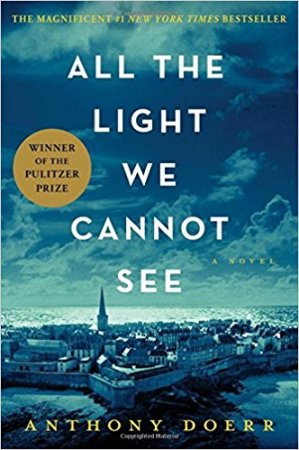 All the Light We Cannot See
All the Light We Cannot See About Grace
About Grace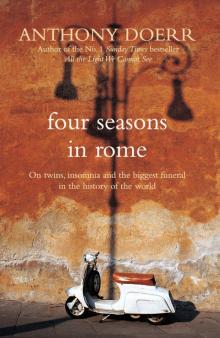 Four Seasons in Rome: On Twins, Insomnia, and the Biggest Funeral in the History of the World
Four Seasons in Rome: On Twins, Insomnia, and the Biggest Funeral in the History of the World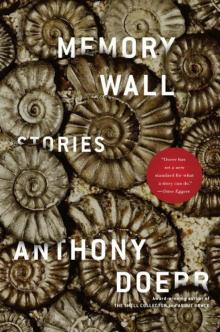 Memory Wall
Memory Wall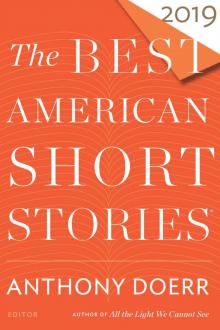 The Best American Short Stories 2019
The Best American Short Stories 2019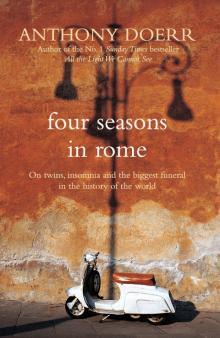 Four Seasons in Rome
Four Seasons in Rome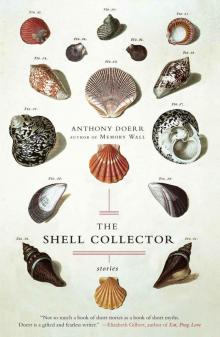 The Shell Collector
The Shell Collector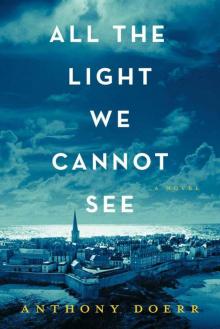 All the Light We Cannot See: A Novel
All the Light We Cannot See: A Novel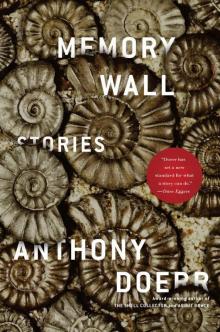 Memory Wall: Stories
Memory Wall: Stories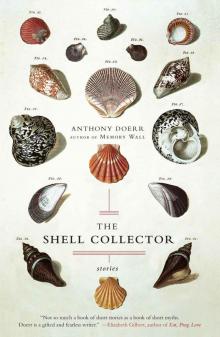 Shell Collector
Shell Collector